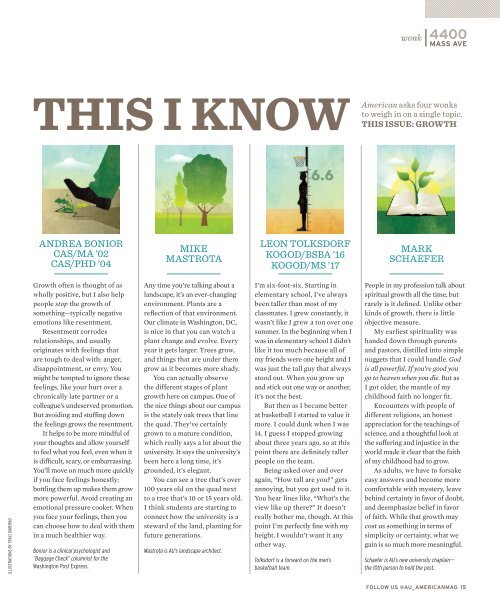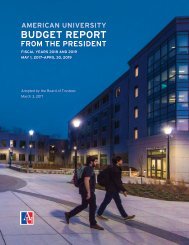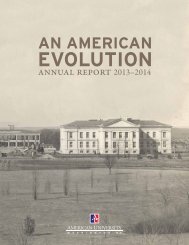American Magazine: November 2016
In this issue, delve into the Scandal-ous life of Judy Smith, meet ESPN’s new public editor, reflect on a decade of transformation under President Neil Kerwin, and learn more about autism—the fastest growing developmental disorder in the United States. Hop on the Metro to Capitol South and get to know a few of AU’s 1,068 Seattle transplants.
In this issue, delve into the Scandal-ous life of Judy Smith, meet ESPN’s new public editor, reflect on a decade of transformation under President Neil Kerwin, and learn more about autism—the fastest growing developmental disorder in the United States. Hop on the Metro to Capitol South and get to know a few of AU’s 1,068 Seattle transplants.
Create successful ePaper yourself
Turn your PDF publications into a flip-book with our unique Google optimized e-Paper software.
wonk<br />
<strong>American</strong> asks four wonks<br />
to weigh in on a single topic.<br />
THIS ISSUE: GROWTH<br />
ANDREA BONIOR<br />
CAS/MA ’02<br />
CAS/PHD ’04<br />
MIKE<br />
MASTROTA<br />
LEON TOLKSDORF<br />
KOGOD/BSBA ’16<br />
KOGOD/MS ’17<br />
MARK<br />
SCHAEFER<br />
ILLUSTRATIONS BY TRACI DABERKO<br />
Growth often is thought of as<br />
wholly positive, but I also help<br />
people stop the growth of<br />
something—typically negative<br />
emotions like resentment.<br />
Resentment corrodes<br />
relationships, and usually<br />
originates with feelings that<br />
are tough to deal with: anger,<br />
disappointment, or envy. You<br />
might be tempted to ignore those<br />
feelings, like your hurt over a<br />
chronically late partner or a<br />
colleague’s undeserved promotion.<br />
But avoiding and stuffing down<br />
the feelings grows the resentment.<br />
It helps to be more mindful of<br />
your thoughts and allow yourself<br />
to feel what you feel, even when it<br />
is difficult, scary, or embarrassing.<br />
You’ll move on much more quickly<br />
if you face feelings honestly;<br />
bottling them up makes them grow<br />
more powerful. Avoid creating an<br />
emotional pressure cooker. When<br />
you face your feelings, then you<br />
can choose how to deal with them<br />
in a much healthier way.<br />
Bonior is a clinical psychologist and<br />
“Baggage Check” columnist for the<br />
Washington Post Express.<br />
Any time you’re talking about a<br />
landscape, it’s an ever-changing<br />
environment. Plants are a<br />
reflection of that environment.<br />
Our climate in Washington, DC,<br />
is nice in that you can watch a<br />
plant change and evolve. Every<br />
year it gets larger. Trees grow,<br />
and things that are under them<br />
grow as it becomes more shady.<br />
You can actually observe<br />
the different stages of plant<br />
growth here on campus. One of<br />
the nice things about our campus<br />
is the stately oak trees that line<br />
the quad. They’ve certainly<br />
grown to a mature condition,<br />
which really says a lot about the<br />
university. It says the university’s<br />
been here a long time, it’s<br />
grounded, it’s elegant.<br />
You can see a tree that’s over<br />
100 years old on the quad next<br />
to a tree that’s 10 or 15 years old.<br />
I think students are starting to<br />
connect how the university is a<br />
steward of the land, planting for<br />
future generations.<br />
Mastrota is AU’s landscape architect.<br />
I’m six-foot-six. Starting in<br />
elementary school, I’ve always<br />
been taller than most of my<br />
classmates. I grew constantly, it<br />
wasn’t like I grew a ton over one<br />
summer. In the beginning when I<br />
was in elementary school I didn’t<br />
like it too much because all of<br />
my friends were one height and I<br />
was just the tall guy that always<br />
stood out. When you grow up<br />
and stick out one way or another,<br />
it’s not the best.<br />
But then as I became better<br />
at basketball I started to value it<br />
more. I could dunk when I was<br />
14. I guess I stopped growing<br />
about three years ago, so at this<br />
point there are definitely taller<br />
people on the team.<br />
Being asked over and over<br />
again, “How tall are you?” gets<br />
annoying, but you get used to it.<br />
You hear lines like, “What’s the<br />
view like up there?” It doesn’t<br />
really bother me, though. At this<br />
point I’m perfectly fine with my<br />
height. I wouldn’t want it any<br />
other way.<br />
Tolksdorf is a forward on the men’s<br />
basketball team.<br />
People in my profession talk about<br />
spiritual growth all the time, but<br />
rarely is it defined. Unlike other<br />
kinds of growth, there is little<br />
objective measure.<br />
My earliest spirituality was<br />
handed down through parents<br />
and pastors, distilled into simple<br />
nuggets that I could handle. God<br />
is all powerful. If you’re good you<br />
go to heaven when you die. But as<br />
I got older, the mantle of my<br />
childhood faith no longer fit.<br />
Encounters with people of<br />
different religions, an honest<br />
appreciation for the teachings of<br />
science, and a thoughtful look at<br />
the suffering and injustice in the<br />
world made it clear that the faith<br />
of my childhood had to grow.<br />
As adults, we have to forsake<br />
easy answers and become more<br />
comfortable with mystery, leave<br />
behind certainty in favor of doubt,<br />
and deemphasize belief in favor<br />
of faith. While that growth may<br />
cost us something in terms of<br />
simplicity or certainty, what we<br />
gain is so much more meaningful.<br />
Schaefer is AU’s new university chaplain—<br />
the 10th person to hold the post.<br />
FOLLOW US @AU_AMERICANMAG 15

















